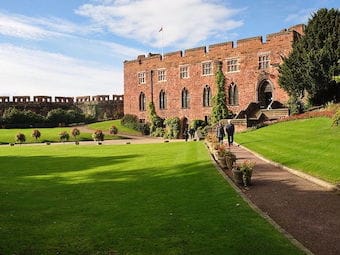Shrewsbury Castle, where Telford was staying in 1788 while planning alterations for the new owners, Sir William Pulteney (1729-1805) and his wife Frances. Sir William was born William Johnstone, and like Telford came from Dumfriesshire. In 1767, Frances inherited the castle from the Earls of Bath, and Sir William, who was MP for Shrewsbury and had adopted his wife’s aristocratic surname, thought it would be nice to use the Castle as a residence.
The parish vestry again met, and the report was read but the meeting exclaimed against so extensive a proposal, imputing mere motives of self-interest to the surveyor. The vestry then called in another person, a mason of the town, and directed him to cut away the injured part of a particular pillar, in order to underbuild it. On the second evening after the commencement of the operations, the sexton was alarmed by a fall of lime-dust and mortar when he attempted to toll the great bell, on which he immediately desisted and left the church.
Early next morning, while the workmen were waiting at the church door for the key, the bell struck four, and the vibration at once brought down the tower, which overwhelmed the nave, demolishing all the pillars along the north side, and shattering the rest. “The very parts I had pointed out,” says Telford, “were those which gave way, and down tumbled the tower, forming a very remarkable ruin, which astonished and surprised the vestry, and roused them from their infatuation, though they have not yet recovered from the shock.”
Abridged
Questions for Critics
1. What is the author aiming to achieve in writing this?
2. Note any words, devices or turns of phrase that strike you. How do they help the author communicate his ideas more effectively?
3. What impression does this passage make on you? How might you put that impression into words?
Based on The English Critic (1939) by NL Clay, drawing on The New Criticism: A Lecture Delivered at Columbia University, March 9, 1910, by J. E. Spingarn, Professor of Comparative Literature in Columbia University, USA.
Archive
Word Games
Spinners Find in Think and Speak
For each group of words, compose a sentence that uses all three. You can use any form of the word: for example, cat → cats, go → went, or quick → quickly, though neigh → neighbour is stretching it a bit.
This exercise uses words found in the accompanying passage.
1 Great. Interest. Person.
2 I. Outside. Wall.
3 Glance. Have. Very.
Variations: 1. include direct and indirect speech 2. include one or more of these words: although, because, despite, either/or, if, unless, until, when, whether, which, who 3. use negatives (not, isn’t, neither/nor, never, nobody etc.)
Prepositions Find in Think and Speak
Each of the words below may be followed by one or more prepositions. Compose your own sentences to show which they might be. Some prepositions are given underneath.
This exercise uses words found in the accompanying passage.
1. Write. 2. Key. 3. Glance. 4. Agree. 5. Wait. 6. Secure. 7. Desist.
Selected Prepositions
About. Against. Among. At. By. For. From. In. Into. Of. On. Out. Over. Through. To. Towards. Upon. With.
Opposites Find in Think and Speak
Suggest words or phrases that seem opposite in meaning to each of the words below. We have suggested some possible answers; see if you can find any others.
This exercise uses words found in the accompanying passage.
Variations: 1.instead of opposites, suggest words of similar meaning (synonyms). 2.use a word and its opposite in the same sentence. 3.suggest any 5 opposites formed by adding dis-.
High Tiles Find in Think and Speak
Make words (three letters or more) from the seven letters showing below, using any letter once only. Each letter carries a score. What is the highest-scoring word you can make?
Your Words ()
If you like what I’m doing here on Clay Lane, from time to time you could buy me a coffee.
Buy Me a Coffee is a crowdfunding website, used by over a million people. It is designed to help content creators like me make a living from their work. ‘Buy Me a Coffee’ prides itself on its security, and there is no need to register.
Related Posts
As a young man, surveyor Thomas Telford was a red-hot political activist who yearned for revolution, but admittedly he had read just one book on the matter.
Picture: © Graham Robertson, Wikimedia Commons. Licence: CC BY-SA 2.0.. Source.
Posted February 25 2022
The more that pioneering engineer George Stephenson understood of the world around him, the more his sense of wonder grew.
Picture: © Luca Baggio, Wikimedia Commons. Licence: CC0 1.0 Universal Public Domain Dedication.. Source.
Posted March 12 2018






